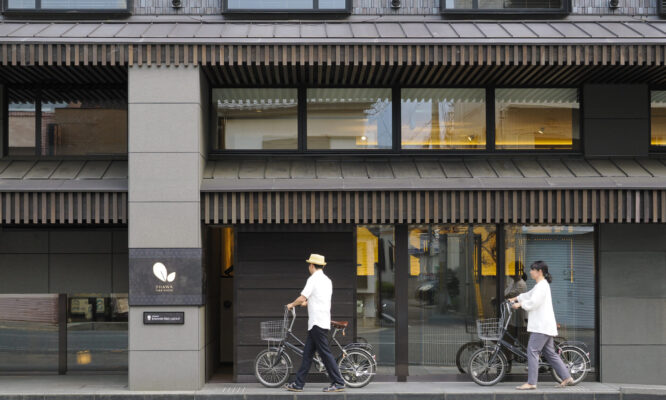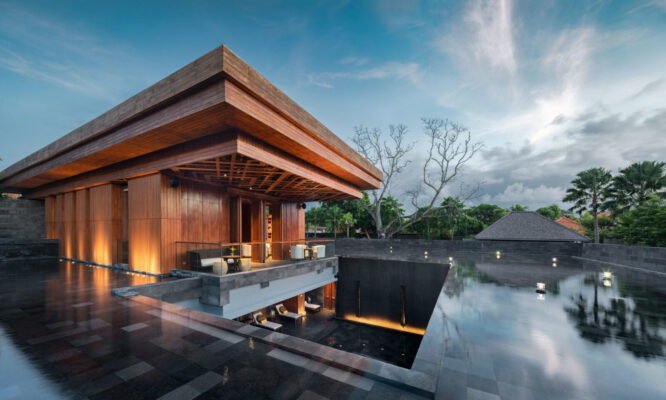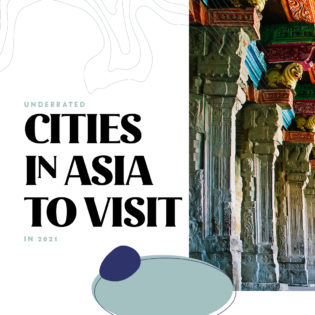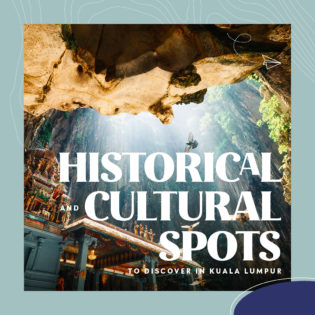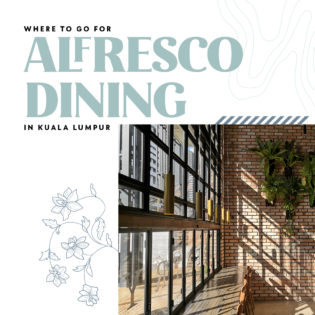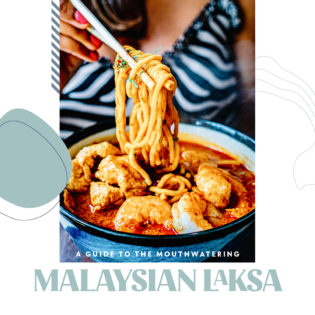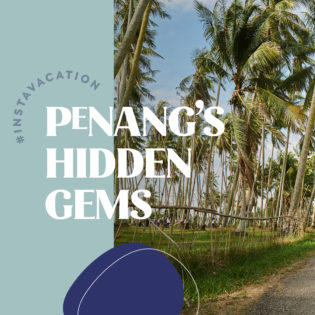Savour Malaysia’s sumptuous taste of time-honoured traditions flavoured with culinary creativity

In a country that’s a true melting pot of cultures, Malaysian kitchens have long produced meals that reflect their people’s multitude of gastronomic traditions. From hearty rice recipes paired with creamy curries to oodles of noodles and fragrant flatbreads, Malaysia’s cuisine is diverse, distinctive and delicious.
Some of the best restaurants in Kuala Lumpur illustrate yet another virtue of Malaysian food: versatility. In a world that’s constantly swept up in change, Malaysia’s menu is evolving too, simultaneously soaking up international influences while sustaining its intrinsic identity.
Here are six memorable eateries that proudly interpret the past, present, and possibly, the future of Malaysian cooking:
Makan Kitchen
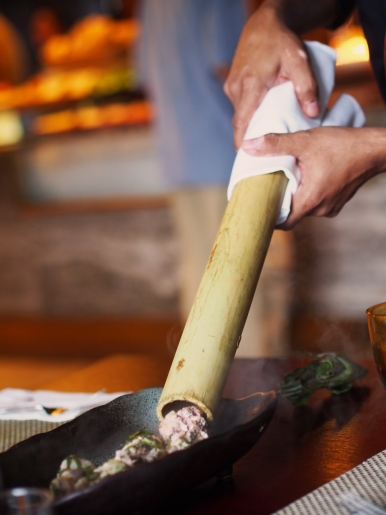
Many of KL’s hotels offer buffets with a sampling of Malaysian dishes, but DoubleTree by Hilton Kuala Lumpur’s flagship restaurant stands out with its wholehearted commitment to this country’s cuisine. Makan Kitchen (makan-kitchen.com) serves a sprawling spread, not only of Malay, Chinese and Indian delicacies but also the less common Nyonya and Kristang choices (more often found in the southern state of Malacca) and Iban native specialities (from the eastern Sarawak state in Borneo).
The restaurant itself is a vibrant venue, flourishing with open kitchens where an army of cooks takes command of piping-hot grills filled with satay (seasoned chicken and beef on skewers) and woks that sizzle aromatically with fried rice. First-time visitors to Malaysia can find everything they need to eat here under one roof; start with sup kambing mamak (spicy lamb broth with potatoes) or roti canai (Malaysia’s version of pancakes, best enjoyed with curry dips) and finish with refreshing ais kacang (shaved ice topped with sweet corn, red beans, grass jelly, palm sugar syrup and evaporated milk).
Makan Kitchen’s selection is especially staggering during dinner, when the evening highlights include pansoh manok, a rare Iban treat of tender, herb-tinged chicken cooked in bamboo stems. The restaurant also recently introduced six new signature dishes reinvented with contemporary ingredients, such as otak-otak (seafood cakes steam-baked with kaffir lime leaves) made with Alaskan king crab.
“We’re delighted to promote Malaysian food in every way possible. We’re even willing to print out our recipes and give them to our guests,” promises Prem Kumar, Makan Kitchen’s sous chef.
The Local
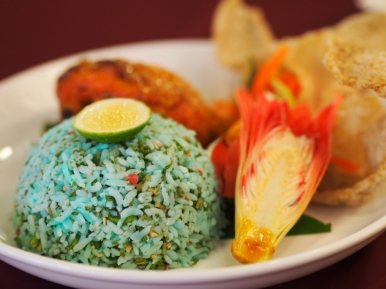
For a more casual setting, head to where Malaysian office workers go for lunch. The Local (thelocal.com.my) is a simple café styled after a kopitiam, or traditional coffee shop, in the Jaya One commercial complex, a half-hour’s drive from Kuala Lumpur’s city centre.
Chef Othman Hasan and his team whip up wallet-friendly plates of nasi kerabu, an eye-catching staple from Othman’s northern home state of Kelantan that features moist rice dyed blue with butterfly-pea flower petals and partnered with ayam percik (chicken in a lip-smacking coconut sauce). Other Malaysian states are well-represented at The Local too; try the char kuey teow, a northern Penang island favourite of flat rice noodles stir-fried in soy sauce with cockles, prawns and bean sprouts.
“As our name suggests, we’re all about being local,” Othman says. “This is fully authentic; we focus on the flavours that Malaysians grew up to love.”
Simply Mel’s
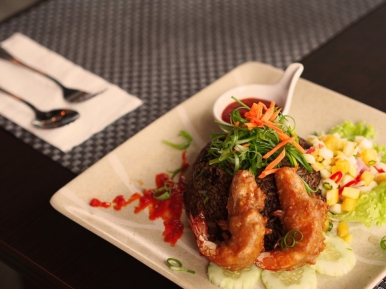
This family-run restaurant soulfully showcases how this country’s cuisine began to absorb fascinating nuances from foreign cultures centuries ago. Simply Mel’s (simplymels.com) is Kuala Lumpur’s sole Kristang eatery, highlighting the heritage of a community of mixed local and Portuguese descent from Malacca, where Portuguese colonial-era sailors and traders first landed in the 16th century.
Simply Mel’s treasure is its chef Melba Nunis, who takes pride in unique recipes she learned from her grandmother and mother. Her daughter, Cheryl Victor, manages the outlet and is equally passionate about dishes like kari keluak galinhia (chicken with luscious, paste-filled black nuts in a pleasantly sour curry), sambal nanas kung kambrang (prawns with chillies and pineapple) and sambal tenggiri binagre (mackerel topped with thick, tangy chilli sauce mixed with shrimp paste).
The family wants to invigorate the popularity of their gastronomic legacy. A cookbook of Melba’s most cherished concoctions is slated to be available in Malaysian bookstores in November, while Cheryl is collaborating with local entrepreneurs to launch restaurants abroad that introduce customers to Kristang creations and other fare from Malacca and Penang.
Ecole P
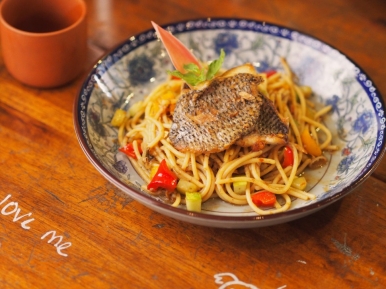
Nostalgia infuses every inch of Ecole P (facebook.com/ecole.p), a delightful café opened last year by two friends, Steven Heng and Ilrene Tee. This hidden gem, nestled on the first floor of a long stretch of business shop-lots, is chock-full of chalkboards, classroom tables, library books, student trophies and cafeteria sweets, evoking the inimitable charm of a Malaysian primary school.
Ecole P’s menu is similarly imaginative, refashioning tasty childhood pleasures into inspired recipes that expertly blend Eastern and Western elements. Pamper your palate with specialities that you won’t find anywhere else. Spaghetti is complemented by a broth of assam laksa gravy (made with tamarind and fish paste) and crowned with pan-fried black tilapia, while chicken fillets are crusted with fish biscuits and coupled with apple slaw, mashed potatoes and mushroom sauce.
For visitors with a sweet tooth, don’t skip the boiled sago pearl pudding drizzled with gula Melaka (coconut palm sugar) and mixed with mango and jackfruit. Quench your thirst with a drink that’s naughtily named ‘Discipline Teacher’, featuring chamomile tea laced with dried local longan fruit, goji berries, red dates and fresh oranges.
Melur & Thyme
The high-profile shopping mall of Suria KLCC at the foot of the Petronas Twin Towers houses a café that epitomises how some contemporary customers attempt to savour Malaysian food, amid a sleekly designed, comfortable ambiance. While the menu at Melur & Thyme (melurandthyme.com) includes Western fare such as burgers and pastas, its most delectable attraction is its Malaysian tapas-style selection, comprising snacks that seem ideal for sharing.
Indulge in small plates of duck satay, marinated overnight and barbecued over charcoal fire, or salmon masak lemak (stewed in coconut milk), ayam masak cili hijau (chicken wings with green chilli paste) and cumi bakar kicap (grilled squid with soy sauce and honey), all served with rice or bread. Wrap up with cream puffs stuffed with chocolate and durian, Malaysia’s renowned king of fruits.
Wondermama
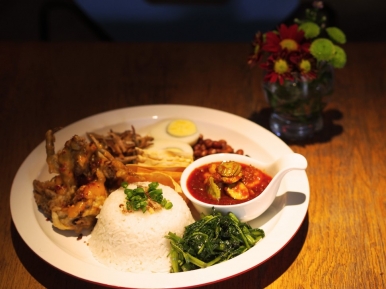
Another mall-based café, Wondermama (wondermama.co) is the most whimsically colourful hangout in the fashionable Bangsar neighbourhood. Wondermama’s hodgepodge of Malaysian and Asian fare is tangled in tantalising twists, courageously combining ingredients with flamboyant flair.
Wondermama pays homage particularly to nasi lemak, the quintessential Malaysian breakfast of moist rice cooked with coconut milk and pandan leaves. The restaurant boasts no fewer than five variations of nasi lemak; each comes not only with customary components like crispy anchovies, peanuts, hard-boiled eggs, water spinach and prawns in chilli paste but also unexpected additions such as salmon, soft-shell crab or chicken karaage, deep-fried the Japanese way.
